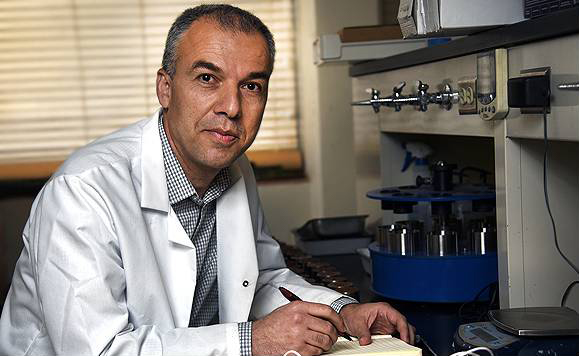For the next seven months Texas Tech University's College of Agricultural Sciences and Natural Resources will be home to Osama Mohawesh, an internationally-recognized scientist as part of the Fulbright Visiting Scholar Program. Mohawesh is one of approximately 850 outstanding foreign faculty and professionals teaching or conducting research in the United States this year through the visiting scholar program.

In his home country, Jordan, Mohawesh serves as a Professor in Water Resources Engineering and as a Dean of Scientific Research at Mutah University. At Mutah University, he teaches courses on smart irrigation, sustainable agriculture, and food security and focuses his research on enhancing land productivity using eco-friendly and low-cost technology. He holds a bachelor's degree from Jordan University of Science and Technology, Jordan, and master's degree form Utsunomiya University, Japan. His doctoral degree is from Tokyo University for Agriculture and Technology, Japan.
"Having a Fulbright Visiting Scholar on campus is a terrific opportunity for CASNR faculty and students to exchange in research ideas and methods that are of mutual interest," said Christy Bratcher, CASNR's Associate Dean for Research. "International collaborations are important in uncovering valuable research discoveries. Interacting with Dr. Mohawesh is an opportunity for faculty and students to extend their global understanding of soil and water resources management."
CASNR officials note that the Fulbright Program is really built on the concept of mutual understanding and the exchange of ideas and knowledge. As with all international students and scholars, there is so much to learn from one another, and as the world continues to become more interconnected that exchange of information is becoming all the more important.
While at Texas Tech, Mohawesh will be working in the laboratory of Sanjit Deb, an assistant professor with Tech's Department of Plant and Soil Science, on the implementation of smart irrigation and biochar amendments for sustainable water resources and soil fertility management. This collaboration will allow tangible progress in their common interest of advancing food security and sustainability in regions that are experiencing rapid population growth and expecting significant impact from global climate change.
"We are very excited to have Dr. Mohawesh with us," Deb said. "His visit is an excellent opportunity to conduct our proposed research. Our work will investigate the influence of biochar on soil water retention and root-zone soil-water dynamics. Our focus is on agricultural soils of different textures in semiarid climatic conditions. We are also very interested in examining the effects of early-season planting in biochar-amended soils on the germination, growth, yield, and quality of cotton germplasm with cold germination ability."
Deb, who joined the CASNR faculty in 2015, broadly focuses his research on soil and water resources management in water-limited and irrigated agricultural production systems, as well as other natural and managed ecosystems. His interests include applied soil physics, vadose zone transport and flow processes, soil-water-plant-atmosphere relationships, and spatial and temporal variability of soil properties. Deb's doctorate in biological and environmental engineering is from the University of Tokyo.
The Fulbright Program, one of the nation's flagship international educational exchange program, is sponsored by the U.S. Department of State's Bureau of Educational and Cultural Affairs. Since its establishment in 1946, the program has provided nearly 300,000 people—approximately 110,000 of them from the United States—with an opportunity to study, teach or research abroad.
The program allows grantees to observe each other's political, economic, educational and cultural institutions, exchange ideas, and participate on joint ventures of importance to the general welfare of the world's inhabitants. It operates in more than 150 countries worldwide.
This story was first published in the CASNR NewsCenter. See the original article here.
